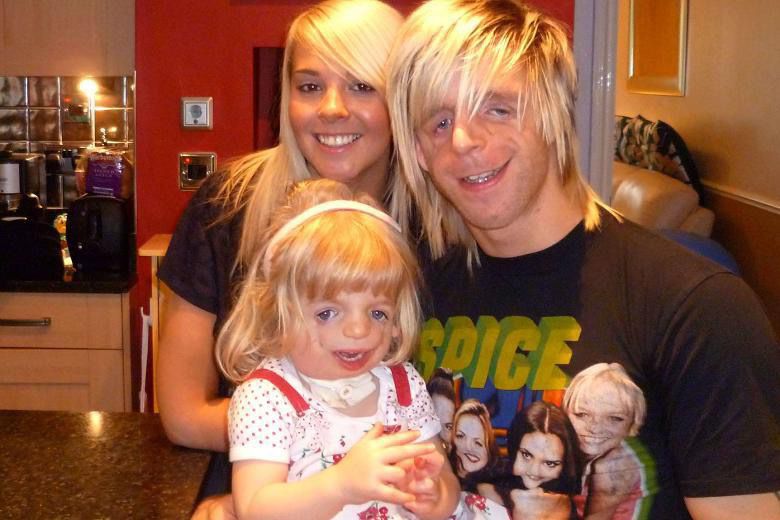
We slowly but surely begin to change that viewpoint, but people still evaluate us based on our appearance. Just as an illustration, when a man wearing a hoodie and having tattoos walks next to police officers, the latter may become suspicious and want to have the man checked (I personally witnessed this the other day).
It’s a depressing outlook on life, but that’s how most people evaluate things—our initial impression comes from the outside.
Jono Lancaster had a difficult upbringing. Despite sharing the same flesh and blood, he was frequently reminded by his distinctive physical characteristics of how vicious some people can be.
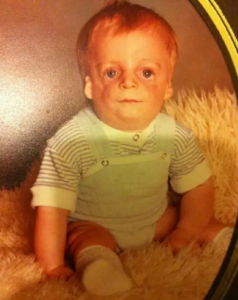
When Jono Lancaster was born in England in 1985, he didn’t resemble the other babies.
Treacher Collins syndrome, a rare genetic condition with recognizable deformities of the head and face, affected the lovely, one-of-a-kind boy.
The doctors predicted that Jono would likely never walk or talk to his parents. His parents were so distraught by the diagnosis that they neglected him after delivery.
“My parents were completely shocked when I was born. After 36 hours in the hospital, I was discharged. Social services were able to get care for me. At the 2015 Nord Conference, Jono recalled that the foster care provider was a woman named Jean.”
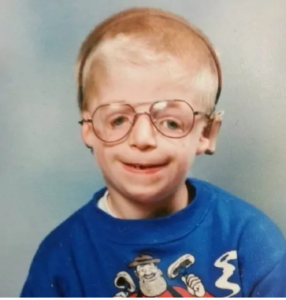
His parents abandoned Jono for adoption when he was only a day old. Thankfully for Jono, a great woman by the name of Jean Lancaster adopted Jono and raised him.
When Jean picked him up, she immediately connected with him, unlike his parents. “When can I take him home?” she questioned the nurse directly as soon as she turned to face her.
Jono was reared by his mother with the same consideration, love, and dedication that any family member would receive.
Even though Jono was well-raised at home, it was difficult for him to grow up around others who only saw him as they perceived him to be.
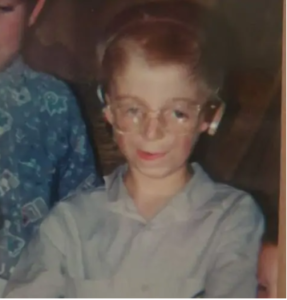
When he went to school, he started to become more self-aware of who he was and how he looked.
“I kind of felt like I was by myself and that I was the only person in the world who was like me,” the speaker said. I wondered, “Why did I have to wind up looking like this? People are lucky enough to win the lottery or they become professional footballers, physicians, or lawyers.”
Although the Treacher Collins syndrome has no effect on a child’s intelligence, his classmates were primarily interested in his appearance. They used to avoid him out of fear of contracting his “sickness.”
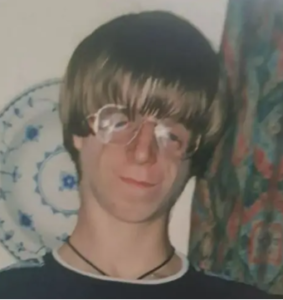
“I used to keep my mum informed of how unhappy I was. He told the BBC, “She had already done so much for me.”
Since the beginning, Jono had been a warrior and wasn’t going to accept rejection based just on his appearance. His loving and devoted mother taught him better lessons than that.
After his biological parents stopped responding to Jean’s messages for five years, she decided to take the next step and adopt Jono on May 18, 1990.
At the 2015 Nord Conference, Jono remarked, “I used to tell other kids that my mom went to the hospital and she looked at all the infants and she chose me, whereas their parents had been stuck with them.”
In a touching Facebook post from 2015, Jono expressed his determination to never forget his foster mother.
“This woman may not be particularly tall, but she has the largest heart of anyone I’ve ever met. This woman has been a foster parent for 30 years; she loves so many people and has given so much of herself.”
“Every time a child was transferred to a new foster home, this woman sobbed because she felt as though she had failed the child. Despite being a single mother in her 40s, this woman accepted me despite not knowing what the future held. I was adopted by this woman, who also gave me a wonderful family in Claire and Stephen. This woman was an angel sent to me at just the right time.”
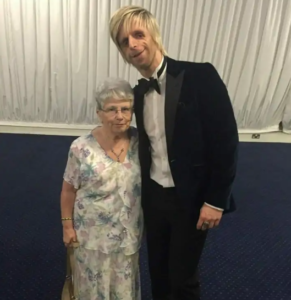
“My mother, my hero, Jean, is the name of this angel.”
Teenage Jono turned rebellious to attract attention and divert focus away from the underlying issue: his physical characteristics. He used to use sweets as bribes and consume a lot of alcohol.
“I was feeling really isolated.”
Jono made the decision to change the course of his life with the support and affection of his foster mother. He turned into a force for good and utilized his special abilities to aid others.
In his adult life as a 37-year-old man, Jono has dedicated himself to TCS. Additionally, he has been leading a team of adults with autism.
He now serves as a source of encouragement and hope and advises parents to give their children who are also facing the same battle a bright future.
He claims, “My parents still don’t want anything to do with me.” “My mindset has changed, and that’s what makes a difference. […] None of it would be altered by me. More than anything else, my attitude was incapacitating. You can accomplish anything if you have the correct attitude.”
While employed as a fitness instructor in 2015, Jono met the woman who would become his wife, Laura Richardson.
They started dating, and unlike most people, Laura accepted him for who he was. She could see his nice, caring, and generous soul as well as the special person he is.
Jono always believed he would use adoption to start his own family before he met Laura.
“I’ve always wanted to have children. My adoptive mother was wonderful, but I never had a father role in my childhood, and I truly, really desire that. I crave father-son moments. In 2011, Jono said, “I want to do the school run, take my kid to dancing, gymnastics, or football – whatever they want.”
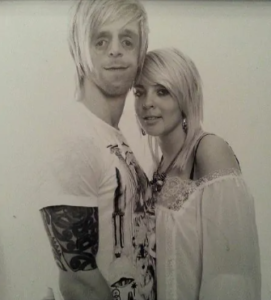
Jono reasoned that perhaps adoption was the best choice.
“It worked incredibly well for me, and I believe it’s fantastic to give a child a second shot. Laura worries that she might find it difficult to care for someone else’s child or that the child would simply want to find its natural parents since she believes she will have those instincts to really want to carry a child. She also fervently desires for our child to be “our” child.”
“And I truly want to take care of her when she is expecting, so that she may relax on the couch or that I can dash downstairs at two in the morning if she has a pickle need.”
Sadly, after ten years of dating, Laura drifted apart. On Instagram, Jono gave a decision explanation and said:
“Laura and I spent ten wonderful years together before deciding to part ways because our relationship was stagnating. There was nothing but respect between the two people and nothing to do with appearance.”
Some of his supporters expressed sympathy and urged Jono to keep his attention on the good things.
“Breakups can never, in my opinion, be made to sound positive. It was tragic,” said Jono in response.
Hear the heartwarming tale directly from Jono, the inspirational beacon: